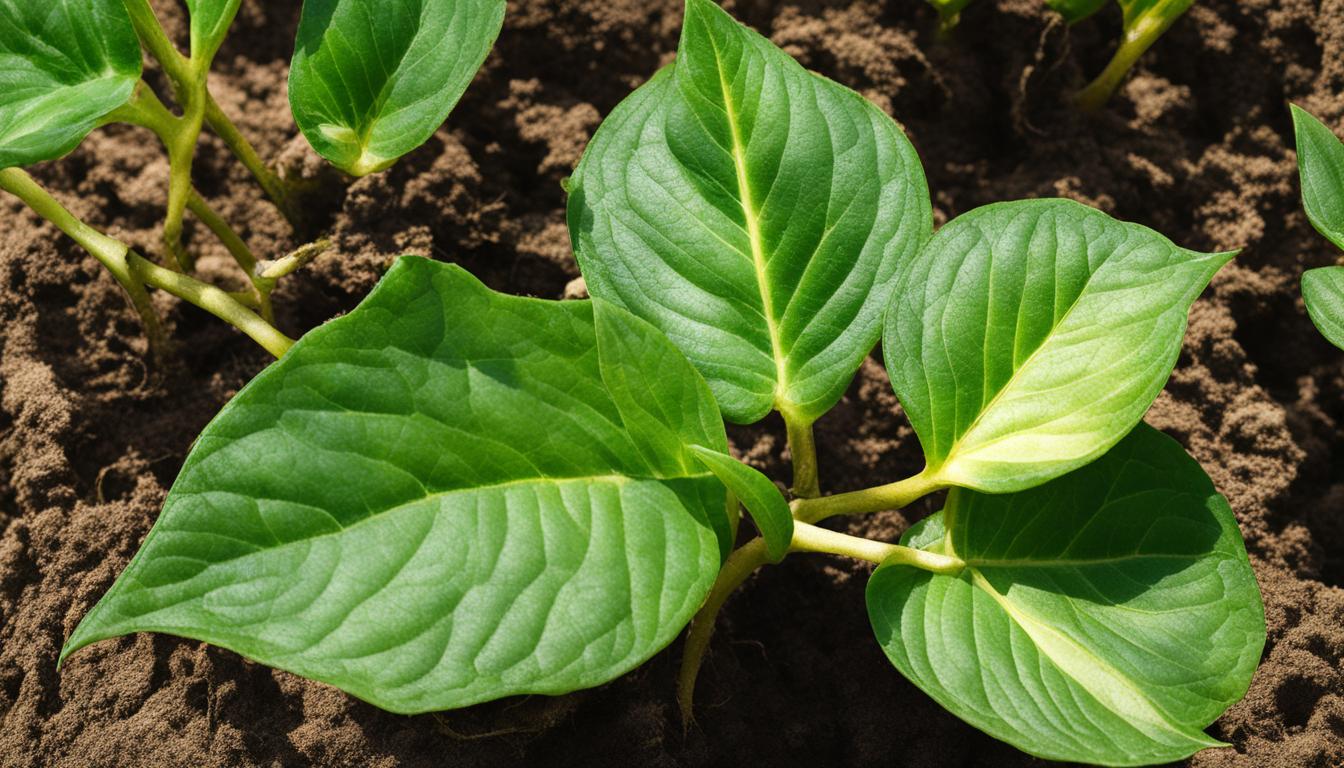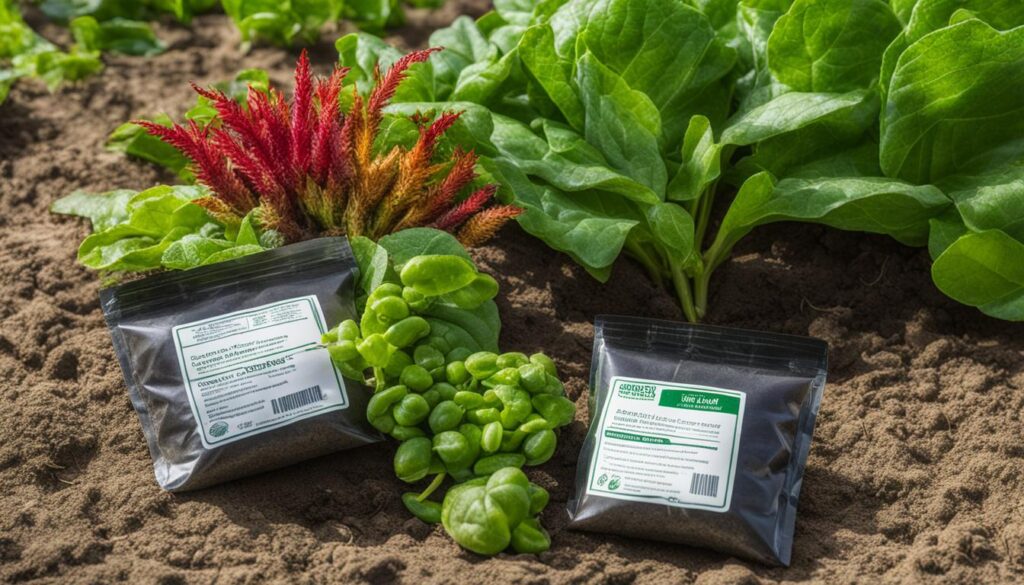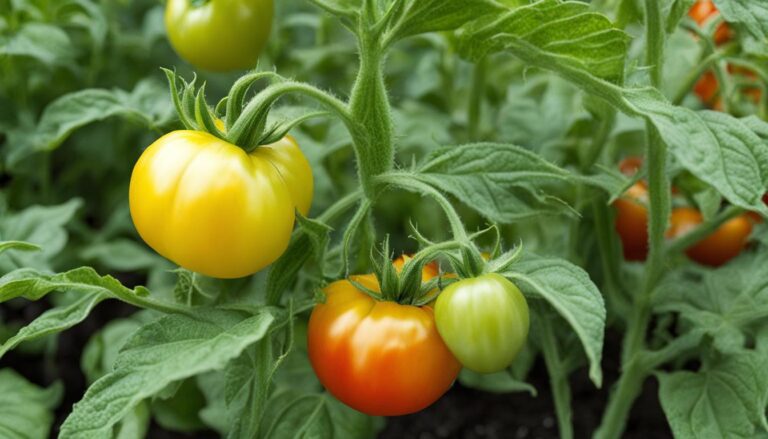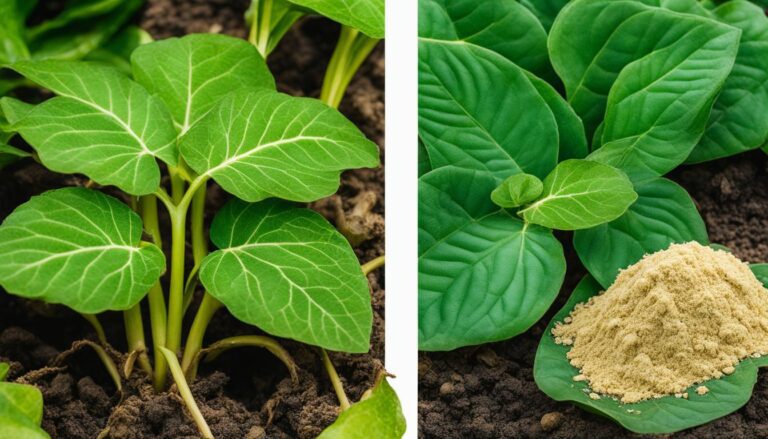
Welcome to my guide on overcoming cobalt deficiency in plants. Cobalt deficiency can have detrimental effects on plant growth, leading to stunted growth, yellowing of leaves, and reduced yield. Understanding the symptoms, causes, and effective strategies for treatment and prevention is crucial for maintaining healthy and thriving plants.
Key Takeaways:
- Cobalt deficiency in plants can result in stunted growth, yellowing of leaves, and decreased yield.
- The main cause of cobalt deficiency is the lack of available cobalt in the soil.
- Effective strategies for treating and preventing cobalt deficiency include supplementing cobalt through fertilizers, improving soil health, and monitoring nutrient balance.
- Cobalt plays a crucial role in plant nutrition, contributing to proper growth, root development, and metabolic processes.
- Alternative solutions to cobalt deficiency include organic practices, crop rotation, and sustainable farming methods.
Symptoms of Cobalt Deficiency in Plants
When plants suffer from cobalt deficiency, they display noticeable symptoms that can impact their growth and overall health. Recognizing these symptoms is crucial for early intervention and treatment. Here are some common indicators of cobalt deficiency in plants:
- Reduced growth: Plants lacking sufficient cobalt may exhibit stunted growth, with smaller leaves and stems than healthy plants.
- Yellowing of leaves (chlorosis): One of the most recognizable symptoms of cobalt deficiency is the yellowing of leaves, particularly between the veins while the veins remain green.
- Poor root development: Cobalt deficiency can also result in weak and underdeveloped root systems, hindering the plant’s ability to absorb water and nutrients from the soil.
- Decreased yield: Insufficient cobalt levels can lead to decreased crop yield, impacting agricultural productivity.
These symptoms occur because cobalt plays a crucial role in various essential processes within plants. Cobalt is involved in nitrogen fixation, a process that enables plants to convert atmospheric nitrogen into a usable form.
It is also required for DNA synthesis and energy production, which are critical for plant growth and development.
By understanding and identifying these symptoms, growers can take prompt action to address cobalt deficiency and ensure the health and productivity of their plants.
Symptoms of Cobalt Deficiency in Plants
| Symptoms | Description |
|---|---|
| Reduced growth | Stunted growth with smaller leaves and stems compared to healthy plants. |
| Yellowing of leaves (chlorosis) | Yellowing of leaves between the veins, while the veins remain green. |
| Poor root development | Weakened and underdeveloped root systems, affecting nutrient and water absorption. |
| Decreased yield | Reduced crop yield and overall agricultural productivity. |
Causes of Cobalt Deficiency in Plants
Cobalt deficiency in plants can have multiple causes, which can vary depending on the specific agricultural context. One of the primary causes is the lack of cobalt in the soil.
In regions where the natural cobalt levels are low, plants may not have sufficient access to this essential element. Additionally, certain soil conditions can hinder the absorption and uptake of cobalt by plants, further exacerbating the deficiency.
These conditions may include high pH levels, excess moisture, or certain soil minerals that interact with cobalt and reduce its availability to plants.
Agricultural practices also play a role in the occurrence of cobalt deficiency. Intensive farming and excessive use of chemical fertilizers can deplete the soil’s cobalt levels over time.
This is particularly true in monoculture systems, where the same crop is grown repeatedly without proper rotation or soil nutrient management. The constant removal of crops without replenishing the soil’s cobalt content can lead to a progressive deficiency in plants.
Another factor to consider is the interaction between cobalt and other nutrients in the soil. Imbalances in nutrient levels, such as high levels of iron or manganese, can interfere with the plant’s ability to absorb cobalt effectively.
These imbalances may be caused by improper fertilizer application or the presence of certain contaminants in the soil. Therefore, it is important to maintain a balanced nutrient profile in the soil to prevent cobalt deficiency in agricultural crops.
Role of Soil Testing and Nutrient Management
In order to effectively address cobalt deficiency in plants, it is crucial to conduct regular soil testing. Soil tests can determine the cobalt levels in the soil and identify any potential nutrient imbalances or deficiencies.
Based on the soil test results, farmers can implement targeted nutrient management strategies to enhance cobalt availability and prevent deficiencies.
Some effective strategies for managing cobalt deficiency include the addition of cobalt-rich fertilizers or amendments to increase cobalt content in the soil.
Organic matter addition through practices like composting can also improve soil health and nutrient availability. Furthermore, implementing crop rotation and diversification can help break pest and disease cycles, reducing the risk of cobalt deficiency and optimizing overall plant nutrition.
| Causes of Cobalt Deficiency in Plants | Solutions |
|---|---|
| Lack of cobalt in the soil | Add cobalt-rich fertilizers or amendments |
| Soil conditions hindering cobalt absorption | Improve soil health and fertility through organic matter addition |
| Intensive farming and excessive fertilizer use | Implement crop rotation and diversification |
| Nutrient imbalances in the soil | Conduct regular soil testing and adjust nutrient management |
Treatment and Prevention Strategies for Cobalt Deficiency
When it comes to addressing cobalt deficiency in plants, there are several effective treatment and prevention strategies that can be employed. These strategies aim to enhance cobalt availability in the soil and ensure that plants have sufficient levels of this essential nutrient for optimal growth and development.
Supplementing with Cobalt-Rich Fertilizers
One approach to treating cobalt deficiency is to provide plants with cobalt-rich fertilizers. These fertilizers contain high levels of cobalt and can be applied directly to the soil or used as foliar sprays.
By supplementing the soil with additional cobalt, plants can absorb the nutrient more efficiently, mitigating the effects of cobalt deficiency.
Improving Soil Health and Fertility
Another strategy for preventing cobalt deficiency is to focus on improving soil health and fertility. This can be done through the addition of organic matter, such as compost, which helps enhance cobalt availability in the soil.
Proper crop rotation and diversification also play a crucial role in maintaining soil health, as they help break pest and disease cycles and reduce the risk of cobalt deficiency.
Monitoring pH Levels and Nutrient Balance
Monitoring and adjusting pH levels and nutrient balance in the soil is essential for preventing cobalt deficiency. Plants require a specific pH range for optimal nutrient uptake, and any imbalances can affect cobalt availability.
Regular soil testing and analysis can help identify and address any pH or nutrient imbalances, ensuring that plants have access to sufficient cobalt.
Implementing these strategies
By implementing these treatment and prevention strategies, growers can effectively combat cobalt deficiency in plants.
Providing cobalt-rich fertilizers, improving soil health, and monitoring nutrient levels are key steps in ensuring that plants have the necessary cobalt for robust growth and development. By addressing cobalt deficiency, growers can optimize crop yield and overall plant health.
The Role of Cobalt in Plant Nutrition

Cobalt plays a crucial role in plant nutrition, contributing to various essential processes and functions. It acts as a key component of vitamin B12, an important molecule involved in various biochemical reactions within the plant.
Vitamin B12 is crucial for DNA synthesis, energy production, and the formation of amino acids, which are the building blocks of proteins. Without sufficient cobalt, plants cannot produce adequate amounts of vitamin B12, leading to impaired growth and development.
In addition to its role in vitamin B12 synthesis, cobalt is also vital for nitrogen fixation in leguminous plants. These plants have a unique ability to convert atmospheric nitrogen into a usable form through the help of nitrogen-fixing bacteria.
Cobalt serves as a cofactor for the enzyme nitrogenase, which facilitates this conversion process. Therefore, without adequate cobalt, leguminous plants would struggle to fix nitrogen efficiently, resulting in reduced productivity.
The Importance of Cobalt in Root Development
Cobalt is essential for proper root development in plants. It stimulates the production of auxins, which are plant hormones responsible for root growth and elongation.
Adequate cobalt levels promote healthy and robust root systems, enabling plants to effectively uptake water and nutrients from the soil. In turn, this supports overall plant growth, development, and resilience to environmental stresses.
Overall, the role of cobalt in plant nutrition is crucial for optimal growth, development, and productivity. Adequate cobalt management is necessary to ensure plants have access to this essential nutrient. From proper supplementation to maintaining soil health and fertility, implementing effective cobalt deficiency management strategies is vital in agricultural crop production.
Alternative Solutions to Cobalt Deficiency

When it comes to combating cobalt deficiency in plants, there are alternative solutions that can be explored.
These alternatives provide sustainable options that go beyond solely relying on cobalt supplementation. By implementing these strategies, farmers can enhance cobalt availability in the soil and ensure healthy plant growth.
One alternative solution is to improve soil health and fertility through organic practices. Composting and cover cropping can help replenish essential nutrients, including cobalt, in the soil. These practices promote the growth of beneficial microorganisms and improve soil structure, ultimately enhancing the availability of cobalt to plants.
Diversifying plant species and rotating crops are also effective ways to prevent and manage cobalt deficiency.
Different plant species have varying cobalt requirements, and rotating crops can help break pest and disease cycles that contribute to cobalt deficiency. This approach not only improves cobalt availability but also promotes overall soil health and reduces the risk of nutrient depletion.
| Alternative Solutions | Benefits |
|---|---|
| Organic practices | Enhances cobalt availability |
| Diversifying plant species | Reduces the risk of cobalt deficiency |
| Rotating crops | Breaks pest and disease cycles |
Adopting sustainable farming practices that focus on soil conservation and nutrient management is another crucial alternative. This approach involves minimizing soil erosion, controlling runoff, and carefully managing fertilizer application.
By ensuring proper soil health and nutrient balance, farmers can create an environment that supports healthy plant growth and minimizes the risk of cobalt deficiency.
Overall, alternative solutions to cobalt deficiency provide farmers with effective strategies to maintain the health and productivity of their crops while promoting sustainability in agriculture.
By implementing these alternatives, farmers can reduce their reliance on cobalt supplementation and work towards creating resilient and thriving agricultural systems.
The Importance of Cobalt Authorization in Livestock Feed
As a livestock farmer, I understand the crucial role that cobalt plays in the health and well-being of animals. Cobalt is essential for proper metabolism, energy production, and overall growth in livestock.
Without adequate cobalt supplementation, our animals can suffer from debilitation, anemia, and stunted growth. That’s why cobalt authorization in livestock feed is so important.
Livestock feed with authorized cobalt compounds helps address cobalt deficiencies, especially in regions where natural cobalt levels in the soil might be low.
By including cobalt in their diet, our animals receive the necessary nutrient for optimal health and productivity. It ensures that they have the energy they need to thrive and grow.
As a responsible livestock farmer, I prioritize cobalt supplementation in my animals’ feed. This involves using authorized cobalt compounds, following recommended dosage guidelines, and regularly monitoring their health and growth.
By providing sufficient cobalt, I can ensure that my animals stay healthy and reach their full potential.
By understanding the importance of cobalt authorization in livestock feed, we can ensure the well-being of our animals and maintain sustainable and productive farming practices.
Cobalt plays a vital role in livestock nutrition, and by prioritizing its supplementation, we are investing in the future of our farms and the quality of our livestock.
FAQ
What are the symptoms of cobalt deficiency in plants?
The symptoms of cobalt deficiency in plants include reduced growth, yellowing of leaves (chlorosis), and poor root development. Cobalt deficiency can also lead to decreased yield and overall plant health.
What causes cobalt deficiency in plants?
Cobalt deficiency in plants can be caused by a lack of cobalt in the soil. This can occur naturally in regions with low cobalt levels or as a result of soil conditions that hinder cobalt availability. Agricultural practices, such as intensive farming and excessive fertilizer use, can also deplete soil cobalt levels.
How can cobalt deficiency in plants be treated and prevented?
Cobalt deficiency in plants can be treated and prevented by providing plants with cobalt-rich fertilizers or foliar sprays to supplement the soil’s cobalt levels. Improving soil health through organic matter addition, proper crop rotation, and monitoring pH levels and nutrient balance in the soil can also help prevent cobalt deficiency.
What is the role of cobalt in plant nutrition?
Cobalt plays a crucial role in plant nutrition as it is involved in various biochemical processes essential for plant growth. It facilitates nitrogen fixation in leguminous plants and is necessary for proper root development and overall plant metabolism.
Are there alternative solutions to cobalt deficiency in plants?
Yes, there are alternative solutions to combat cobalt deficiency in plants. Improving soil health through organic practices, rotating crops, and diversifying plant species can enhance cobalt availability. Adopting sustainable farming practices that focus on soil conservation and nutrient management can also contribute to long-term cobalt availability in agricultural systems.
Why is cobalt authorization in livestock feed important?
Cobalt authorization in livestock feed is crucial for ensuring the health and well-being of animals. Livestock rely on cobalt for proper metabolism, energy production, and overall growth. Without adequate cobalt supplementation, livestock can suffer from debilitation, anemia, and stunted growth.






